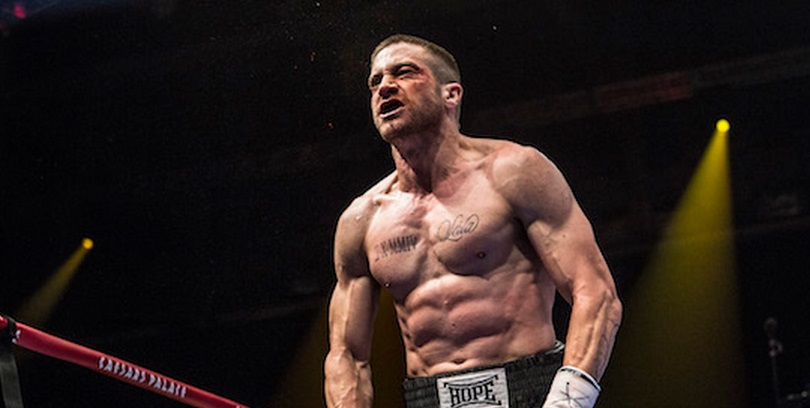There is something so ineffably cinematic about boxing. It’s that story of the underdog that lends itself so well to the silver screen – this idea that somebody can be beaten to a pulp, taking hit after hit – but then just one knock out blow will see them triumph. It’s that exact notion that Antoine Fuqua abides by in his latest endeavour Southpaw. And believe me, our protagonist takes a great deal of hits. A few too many, in fact.
Jake Gyllenhaal is the fighter in question, the undefeated superstar Billy Hope – who with a loving wife in Maureen (Rachel McAdams) and daughter, Leila (Oona Laurence) has everything he needs in life. Famed for his unique style of fighting – whereby he allows the opposition a number of punches, only to capitalise on their fatigue and strike with a finishing blow. It’s served him well in the past – but now, he’s not only on the back foot in the ring, but outside of it too, as his life crumbles in front of his very eyes, and he knows a change of approach is needed to reinvent his career. Which is where the forward thinking trainer Titus Wills (Forest Whitaker) comes into proceedings.
It’s distinctly intriguing to get behind the facade of such an esteemed boxer – as when we bear witness to those in this profession and of such a standing, it’s nearly always at publicity events, either in the ring, or at the weigh in – and there’s always a bravado, a macho persona they’re giving off in an attempt to intimidate the opposition. As such we rarely are given access to the human being within, the husband, the father. However any sense of naturalism is undermined, persistently, by Fuqua’s inclination to be melodramatic. Just take the fights themselves – shot beautifully, and in an engaging manner as we feel as though we’ve just stepped into the ring with the two boxers – but there’s more punches that land to the head in one small clip from a fight that we’re usually accustomed to seeing across 12 rounds. Not a huge problem as such, but emblematic of a film that deviates so carelessly away from reality, which is detrimental to the audience’s enjoyment.
The same can be said in regards to Billy’s journey – as his bad luck becomes unrelenting, and thus, somewhat difficult to believe in. Stories of the underdog are immensely entertaining – you only need to see Rocky to prove that – but this takes up so much licence, and it can push the viewer into being pedantic, questioning certain inclusions and the legitimacy of it all. Thankfully, however, Gyllenhaal is absolutely terrific, in a nuanced, empathetic turn. In some ways the archetypal Hollywoodisation of this tale is beneath him, but takes little away from his performance. The fact he can play such a gaunt, desperate man in Nightcrawler and be so creepy, to now being so imposing and intimidating is of great commendation to the actor. Meanwhile, a mention by way of the youngster Laurence is needed, as she’s excellent in the role of Leila – and where young actors can often devalue movies of this ilk, she matches her older counterparts at every turn.
The overstated nature of this title will push a more cynical viewer away from this project (yes, there’s a good old-fashioned training-for-a-big-fight-montage), but there remains enough to admire nonetheless. But this is where Southpaw struggles – it’s not quite sure what it wants to be. Fuqua flirts with the idea of being a character driven, intimate study of this one man, a rags to riches tale of a somebody who went from the streets to worldwide fame. But at the same time, it wants to revel in being unashamedly entertaining. Having its cake and eating it springs to mind.












